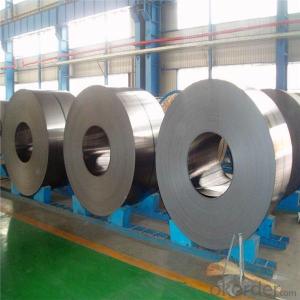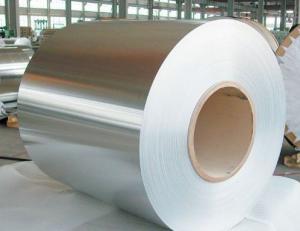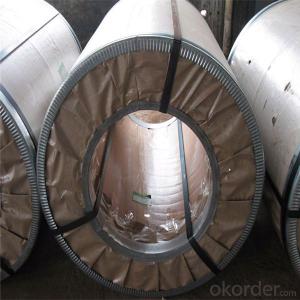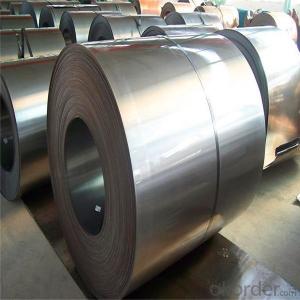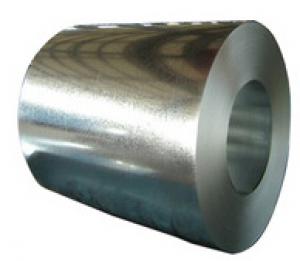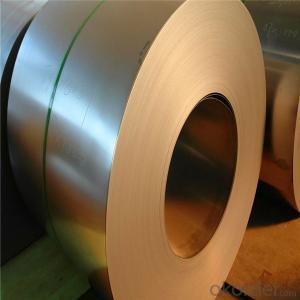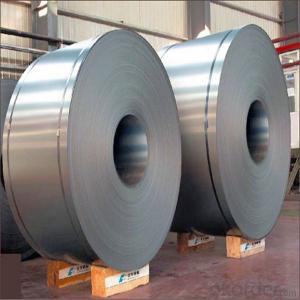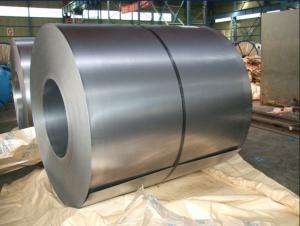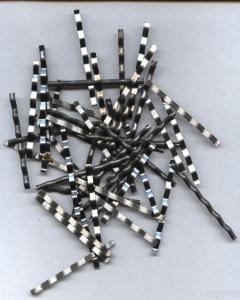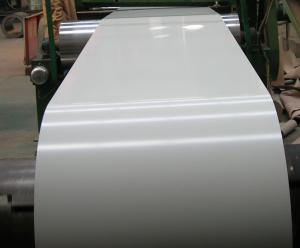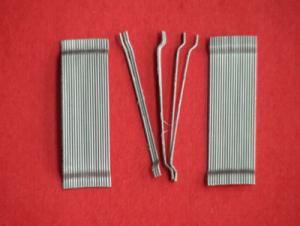High Quality Surface Finish Cold Rolled Steel Made in China
- Loading Port:
- China main port
- Payment Terms:
- TT OR LC
- Min Order Qty:
- 23 m.t.
- Supply Capability:
- 50000 m.t./month
OKorder Service Pledge
OKorder Financial Service
You Might Also Like
Specification
Prime Quality SPCC Cold Rolled Steel Sheet/Coil
Widely used to appliance,automobile industry or other decoration usage.
Certificate: ISO9001
Packing Details: Wrapped by water proof paper and plastic film.Covered with iron sheet,strapped by steel strips to protect the damage under transportation.
Details please check following format
Brief Introduction
Cold rolled steel coil is steel that has been worked below its recrystallization temperature by passing it between a pair of rollers. Recrystallization temperature is the temperature at which grains in the lattice structure of the metal have been rearranged, leaving it free of strain and deformations. Cold rolled steel coil is pre-treated before being cold rolled with a process known as pickling, which uses strong acids to remove scale and other impurities. The cold rolled steel coil is then passed through rollers to reduce its thickness. Most cold rolling takes place in multiple passes and as the size of the cold rolled steel coil is further reduced, its strength and hardness both increase, but its ductility decreases. After cold rolling, heating the metal up in a process known as annealing can restore some of its ductility. The final cold rolled steel coil may be manufactured in the form of sheets, strips, bars, or other forms.
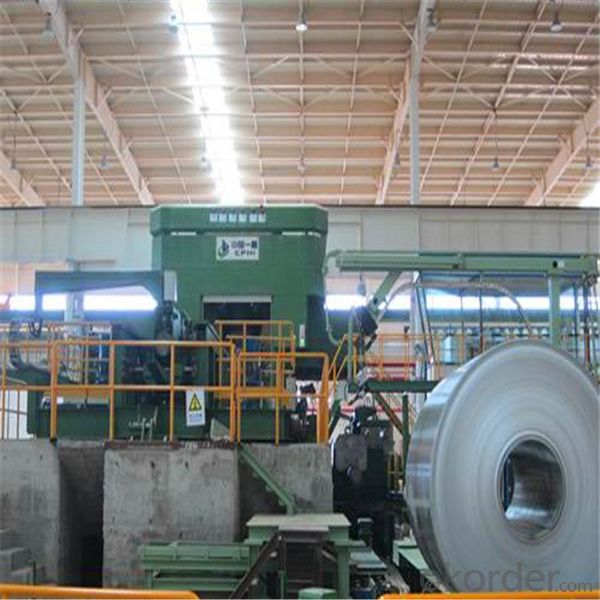
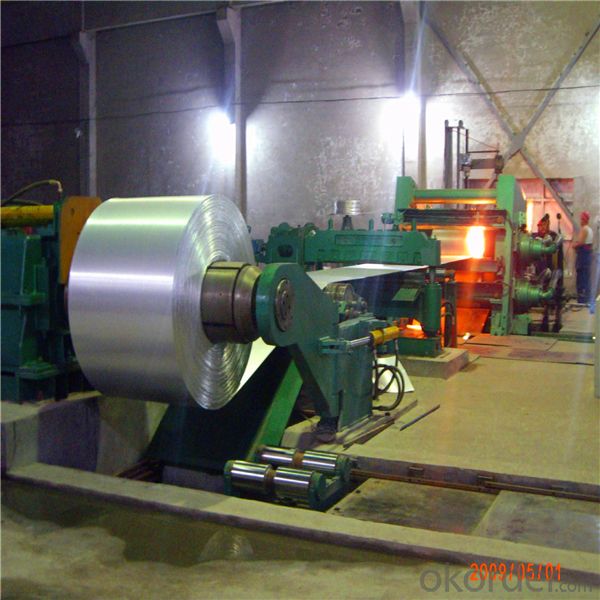
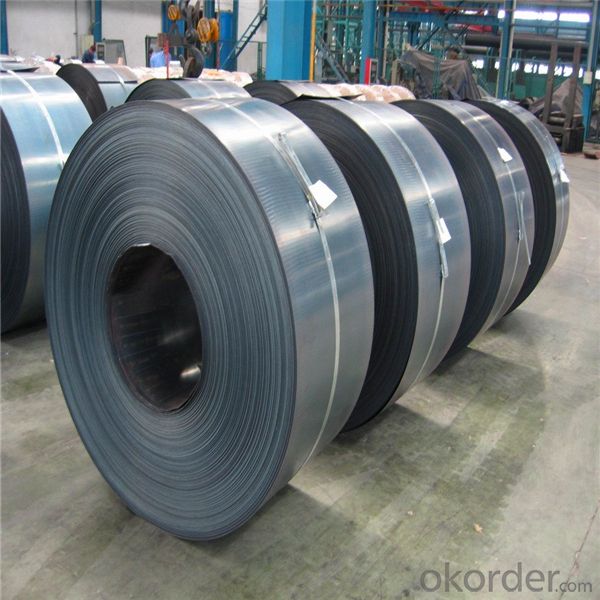
Specification
1. Thickness: 0.4-2.0mm
2. Width: 900-1250mm
3. Inner Diameter: 508mm
4. Weight of Steel Coil: 3-15MT
5. Heat Treatment: Annealed
6. Margin Status: EC & EM
7. Surface Quality: FB&FC
8. Surface Status: SB & SD
9. Surface Treatment: Oiling
Mechanical Properties
1. Yield Strength: ≤320MPa
2. Tensile Strength: ≤370MPa
3. Elongation (L=50mm, b=25mm) When:
(1) Nominal Thickness<0.25mm: 30%
(2) Nominal Thickness 0.25mm-<0.40: 32%
(3) Nominal Thickness 0.40-<0.60mm: 34%
(4) Nominal Thickness 0.60-<1.0mm: 36%
(5) Nominal Thickness 1.0-<1.6mm: 37%
(6) Nominal Thickness >1.6mm: 38%
- Q: What are the applications of steel angles?
- Steel angles have a wide range of applications in construction and manufacturing industries. Some common uses include providing structural support in buildings and bridges, reinforcing concrete structures, creating frameworks for machinery and equipment, as well as forming braces and brackets for various architectural and engineering projects.
- Q: How are steel products used in the construction industry?
- Steel products are commonly used in the construction industry for various purposes, such as structural framing, reinforcing concrete, and creating durable infrastructure. They provide strength, stability, and flexibility in building designs, allowing for the construction of high-rise buildings, bridges, and other large structures. Steel products are also used for roofing, siding, and cladding due to their resistance against corrosion and extreme weather conditions. Additionally, steel is often employed in the construction of industrial facilities and manufacturing plants, thanks to its ability to support heavy machinery and equipment. Overall, steel products play a vital role in modern construction, ensuring safety, durability, and versatility in various building projects.
- Q: How is steel plate formed into seamless pipes?
- Steel plate is formed into seamless pipes through a process called piercing and rolling. In this process, the steel plate is first heated and then pierced to create a hollow tube. The pierced tube is then elongated and shaped using a series of rollers to achieve the desired dimensions and thickness. This seamless pipe manufacturing method ensures a uniform and continuous structure without any welded seams.
- Q: What are the maintenance and care requirements for different steel products?
- The maintenance and care requirements for different steel products can vary depending on their specific use and environment. However, in general, steel products should be regularly cleaned and inspected for any signs of damage or corrosion. This can be done by using mild soapy water and a soft cloth or sponge to remove dirt or grime. It is important to avoid using abrasive cleaners or tools that could scratch or damage the steel surface. Additionally, applying a protective coating, such as a wax or oil-based product, can help prevent rust and corrosion. Regular inspections should also be carried out to identify and address any issues promptly. Overall, proper maintenance and care can help extend the lifespan and ensure the optimal performance of steel products.
- Q: What are the applications of steel wire mesh in agricultural fencing?
- Steel wire mesh is commonly used in agricultural fencing due to its durability and strength. It provides effective containment for livestock, keeping them safe and secure within designated areas. Additionally, steel wire mesh acts as a barrier, preventing unauthorized entry of pests and predators, thereby protecting crops and livestock. It can also be used to create enclosures for poultry, rabbits, and other animals, allowing for efficient management and control. Overall, the applications of steel wire mesh in agricultural fencing are essential for maintaining the integrity and productivity of agricultural operations.
- Q: What are the applications of steel gratings in oil refineries?
- Steel gratings are commonly used in oil refineries for various applications such as platforms, walkways, stair treads, handrails, and drainage covers. They provide a strong and durable flooring solution that can withstand heavy loads, corrosive environments, and high temperatures. Steel gratings also offer excellent drainage properties, allowing for the efficient removal of liquids and debris, and they provide a non-slip surface for enhanced safety in oil refinery facilities.
- Q: What are the different types of steel beams and their applications?
- There are several types of steel beams commonly used in construction and their applications vary based on their characteristics. Some of the common types include I-beams, H-beams, and T-beams. I-beams, also known as W-beams, have a characteristic shape resembling the letter "I". They are widely used in construction due to their high strength-to-weight ratio and are commonly used in structural support applications such as building frames and bridges. H-beams, also known as wide flange beams, have a shape resembling the letter "H". They are often used in structural applications that require heavy loads, such as columns and retaining walls. H-beams offer excellent bending and shear resistance, making them suitable for various construction projects. T-beams, also known as Tee beams, have a shape resembling the letter "T". They are commonly used in reinforced concrete structures, where they provide support for slabs and beams. T-beams are typically used in applications such as floor and roof systems, as well as bridge decks. Each type of steel beam has its own unique properties and applications, and the choice of beam depends on the specific requirements of the construction project.
- Q: What are the common uses of steel in everyday life?
- Steel is widely used in everyday life for various purposes. It is commonly used in the construction industry for buildings, bridges, and infrastructure due to its strength and durability. Steel is also used in the manufacturing of automobiles, appliances, and machinery, as it provides the necessary strength and rigidity. Additionally, steel is used in the production of household items such as cutlery, utensils, and tools. Its versatility and reliability make it an essential material in numerous applications, making our lives more convenient and efficient.
- Q: How are steel products used in the telecommunications industry?
- Steel products are used in the telecommunications industry for various purposes, including the construction of telecommunication towers, transmission lines, and underground cable systems. Steel provides the necessary strength and durability required to support the infrastructure and ensure reliable communication networks. Additionally, steel enclosures and cabinets are used to protect sensitive equipment and cables from environmental factors, ensuring their longevity and functionality.
- Q: What are the different types of steel fencing materials?
- There are several types of steel fencing materials, including wrought iron, galvanized steel, aluminum-coated steel, and stainless steel. Each type has its own unique characteristics and benefits, such as durability, corrosion resistance, and aesthetic appeal.
Send your message to us
High Quality Surface Finish Cold Rolled Steel Made in China
- Loading Port:
- China main port
- Payment Terms:
- TT OR LC
- Min Order Qty:
- 23 m.t.
- Supply Capability:
- 50000 m.t./month
OKorder Service Pledge
OKorder Financial Service
Similar products
Hot products
Hot Searches
Related keywords
